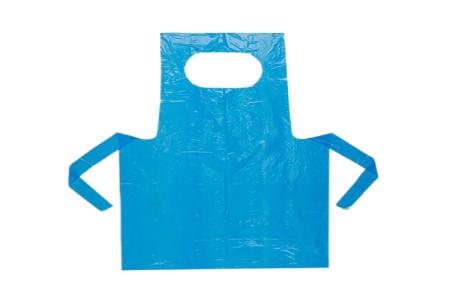Disposable Polyethylene Aprons: Are They Safe To Use on Food?
Published on 2022/8/24

Share to:
Disposable Polyethylene Aprons: Are They Safe To Use on Food?
Even though disposable plastic aprons are designed to be used only once, some users have been known to reuse them many times. And others have been known to use their own clothes or towels as a substitute for an apron when cooking at home. Either way, there are plenty of reasons not to put these garments through the rinse and repeat cycle.
Polyethylene (PE) disposable aprons are a quick-fix solution for keeping your kitchen clean and sanitary while making vegetables, chicken fingers, and other food items. In other words, they make it easy to keep germs out of your kitchen while preparing meals. But are they safe to use on food? Even though disposable plastic aprons are designed to be used only once, some users have been known to reuse them many times. And others have been known to use their own clothes or towels as a substitute for an apron when cooking at home. Either way, there are plenty of reasons not to put these garments through the rinse and repeat cycle. That’s because doing so with an apron can not only cause harmful microorganisms to grow but also lead to the build-up of bacteria, fungi, and other pathogens.
Is Disposable Polyethylene Apron Safe to Use on Food?
The FDA classifies disposable plastic aprons as medical devices. This means that the manufacturers of these aprons are required to provide detailed warnings about their proper use. In addition, these garments are not designed for food contact. This means that they should never be used on raw or uncooked foods. Indeed, this is one of the most common risks associated with the use of disposable plastic aprons. For example, Listeria bacteria can be found in raw foods like raw meat, poultry, and seafood. However, it is extremely rare for Listeria to cause illness in healthy individuals. On the other hand, the presence of this microorganism can cause serious complications in vulnerable groups like pregnant women, the elderly, and those with weak immune systems. When food contaminated with Listeria enters the body, it can result in listeriosis infection.
Avoid Reusing Disposable Aprons
When you’re done with an apron, don’t just throw it in the garbage. Instead, dispose of it properly by sealing the bag tightly, crumpling it up, and tossing it in the trash. Doing so will help keep other people’s health risks at bay while also keeping your kitchen and home cleaner. Using a disposable apron once should be enough to get the job done. Once you’re done with it, don’t just put it back in the drawer with your other aprons. Instead, seal the bag tightly and crumple it up so that no one else can use it to prepare food. If you don’t have a trash can in your kitchen, seal the bag inside a drawer.
Always Rinse and Dry Your Disposable Apron
When using a disposable plastic apron in the kitchen, always make sure to wash it thoroughly. This will help keep your kitchen safe from harmful microorganisms. If you’re not able to wash your apron properly, you can always run it under warm water and use a bleach and water solution to kill the remaining harmful pathogens. You should also make sure to dry your disposable apron completely before putting it back in the drawer. Doing so will help to prevent the growth of harmful microorganisms in other foods.
Avoid Using Disposable Abrasive Rubbers To Clean Dishes
While disposable plastic aprons are designed to make your life easier, it’s important to avoid using abrasive cleaning products like abrasive cleaning razors or abrasive cleaning sponges on them. Doing so can cause rips or tears in the plastic. These rips and tears can lead to harmful microorganisms getting inside the apron and then into other foods.
Conclusion
When used properly, disposable plastic aprons are a quick, convenient, and easy way to protect yourself from harmful microorganisms in the kitchen. But these garments aren’t designed for food contact, so make sure to follow the instructions and don’t use them for preparing raw or uncooked food. Dispose of the apron properly and wash it thoroughly to avoid the growth of harmful microorganisms. This will help keep your kitchen and home safe while also keeping them cleaner.


 WhatsApp
WhatsApp
Send us your message
You can send an email asking for the price and detailed information of this product. We will reply you as soon as we receive your email